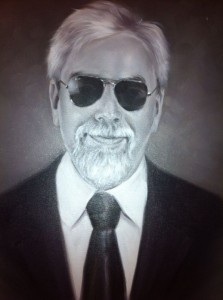 Desmond (Des) Kenny was born in 1947 and lived his younger years in the Irish midland town of Newbridge. At the age of seven, a playtime accident saw him begin to lose his eye sight, first in one eye and then in the second eye. By the time he was nine-years-old, his eye-sight had gone totally, leaving him blind.
Desmond (Des) Kenny was born in 1947 and lived his younger years in the Irish midland town of Newbridge. At the age of seven, a playtime accident saw him begin to lose his eye sight, first in one eye and then in the second eye. By the time he was nine-years-old, his eye-sight had gone totally, leaving him blind.
A residential school in Dublin for children who are blind became his home for a further nine years, with return visits to his family only for Easter, Christmas and summer holidays. His first collection of Poems “My sense of Blind and Other Collected Poems” provides us with some insight into the feelings of difference and alienation he experienced in having to leave his family at such a young age, and having to start on his life’s journey as a person who would remain blind all of his life.
“Past Tense” is his new poetry collection. The poems in this volume deal with love and relationships in growing up in the 60s and 70s. His “tongue-in-cheek” style provides us with his experiences voiced with sensitivity and humour.
Other poems (in “Past Tense”) take us to his struggle with meanings in life, religion and death, as well as continuing his attempt to express, for our understanding, what it means to live as a person who contends daily with what he describes as the “limited dictionary” available to him when interpreting life in a “seeing world”.
Des Kenny retired in July, 2014 from his position as CEO of NCBI (the national sight loss agency in Ireland), a position he held from November, 1986 to his retirement. He has achieved a Masters in health care economics and an MBA. He is available for consultation on governance and operational matters relating to the not for profit health care and personal social services sector in Ireland. He is also available to consider poetry readings.
In “my Sense of Blind and other Collected Poems”, the reader can readily detect a tension which exists between the man “busying at business” and fighting for his reflective space in which to write his poetry. Now that he has reached retirement from a busy and stretching job, he feels he can start to more fully occupy his creative space. He sees himself returning to the verse and half poems of earlier years as well as bringing the reader on a shared journey in interpreting meaning from and making sense of a world which must be differently experienced when it is not seen in the same way you look at it from your hotel balcony or through the rain drops on the living room window panes.
“When you take the lived experience of a disability as significant as blindness into poetry, you have to work with only the scant and difficult resources of moods and feelings,” Des Kenny says. “You cannot write in the second-hand vocabularies of how others see things. I am long since moved on past the cathartic episodes of being made feel different and wishing not to be different. I have arrived at a place in my life where I can poke fun at myself and my circumstances and value my own view of things. I have access to a treasure throve of unique riches from how I have lived my life and from the success I achieved in the company of work colleagues and friends and, of course, my own family. Some people might call that as “having arrived” but I view it as just having been alert during those passages of experience that made me what I am today. My poems are the maps of parts of my journey along the way.”